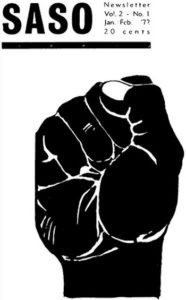
South African Students' Organization logo
*On this date in 1969, we celebrate the South African Students' Organization (SASO). SASO was a body of black South African university students who resisted apartheid through non-violent political action.
The organization was formed under the leadership of Steve Biko and Barney Pityana and made vital contributions to the ideology and political leadership of the Black Consciousness Movement. The South African Students' Organization (SASO) members were black students from the University of Fort Hare, the University of Zululand, the University of the North at Turfloop, and the Black Section of the University of Natal (UNB). It also included various theological seminaries, teacher training colleges, and other higher education institutions in South Africa, which were segregated under the apartheid-era Bantu Education Act at the time.
However, SASO has its roots in the National Union of South African Students (NUSAS) and the University Christian Movement (UCM), an ecumenical students' association that attracted a membership of politically inclined black Christians partly because of the growing influence of black theology. At the 1968 NUSAS conference in Grahamstown, black students broke off to discuss the problems facing black students and the best means to address them. After another consultative meeting organized by UNB students in December 1968, SASO was officially launched in July 1969 at its inaugural conference. It was held at the Turfloop campus of the University of the North, where its constitution was ratified.
In subsequent years, SASO initially evaded serious state repression. Its membership grew on black campuses across South Africa from a base of fourteen branches (four in seminaries and the largest at Turfloop) in June 1970. Its main office was in Durban. NUSAS and the UCM were multiracial, but white students, a major point of concern for some black members, dominated their membership and leadership. In the case of NUSAS, the black students disagreed politically with white liberals in the organization for a more radical stance on apartheid.
In the aftermath of the 1974 pro-Frelimo rallies, the South African government charged the so-called SASO Nine with violations of the Terrorism Act. Following a high-profile trial, all were found guilty of "encouraging and furthering feelings of hostility between the Black and White inhabitants of the Republic" and were sentenced to imprisonment, leaving SASO effectively "leaderless." Biko's political activity had a banning order against him. State repression worsened after the 1976 Soweto Uprising, in which Black Consciousness movements played a leading role. In the crackdown that followed, the government, on October 19, 1977, banned SASO and various other Black Consciousness organizations, making the organization and any association with it illegal.
No clear successor organization arose, although the Black Consciousness mantle was passed to a new generation of groups. However, other former SASO members joined Congress-aligned organizations, revived militancy, and state repression drove many students into exile to train with the ANC's Umkhonto we Sizwe. Meanwhile, inside South Africa, Congress-aligned organizations began increasingly to dominate community organizing, the trade union movement, and, through the Congress of South African Students, the students' movement.